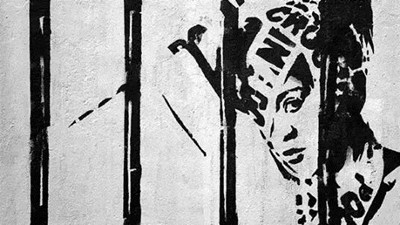The explanation that many academics and think-tanks favour is that guards are less tolerant towards women. A 1994 study of Texan prisons found that wardens in female prisons demanded total compliance but those in male prisons did not. Ellie Butt at the Howard League, a prison-reform charity, thinks little has changed. Female inmates, she says, are considered doubly deviant—“a woman, and a criminal?” says one female ex-con, “You're practically Myra Hindley!” Guards may be more likely to write up and punish women's verbal assaults on staff than men's.
很多智庫和學(xué)術(shù)機(jī)構(gòu)偏向于獄警對(duì)女囚犯容忍度更低這一說法。1994年,一項(xiàng)對(duì)德克薩斯州囚犯的調(diào)查顯示,女性監(jiān)獄中的典獄官要求犯人們絕對(duì)服從,而在男性監(jiān)獄中則不對(duì)囚犯作此要求。Howard League是一個(gè)致力于監(jiān)獄改革的慈善團(tuán)體,Ellie Butt是其中一員。。她認(rèn)為監(jiān)獄的情況并沒有得到什么改善。(由于對(duì)女性性別的成見,)女性囚犯的偏激行為被放大了—“一個(gè)女人,同時(shí)也是一個(gè)罪犯?”一個(gè)有前科的女性說到(獄警對(duì)她的評(píng)價(jià)),“你活脫脫就是個(gè)邁拉·希德莉!”(譯者注:Myra Hindley,被稱為“沼澤殺手”,與她的男友一起誘拐、性侵、殺害數(shù)名孩童)相較于男性囚犯,獄警們更愿意記錄并懲罰女性囚犯對(duì)他們的語言攻擊。
Government figures hint this is true. “Disobedience or disrespect” was the reason for 44% of punishments given to female prisoners in 2014 compared with 39% of those handed out to men. Farah Damji, who has spent time in prison, says male guards were particularly keen to put her in her place. “It was a sense of, you think you have some status in the outside world? I'll show you,” she says. Ms Butt reckons such treatment contributes to the disproportionate levels of self-harm committed by women—26% of the prison-system total in 2014. Punishments were designed for men, says Juliet Lyon at the Prison Reform Trust, a charity, and are often a bad fit for women.
政府?dāng)?shù)據(jù)也證實(shí)了這一點(diǎn)。2014年,女性囚犯受到的懲罰,44%是因?yàn)椤胺纯够虿蛔鹬亍保行詣t是39%。Farah Damji曾經(jīng)入獄,她說男獄警尤其想讓她乖乖聽話。“感覺就像是(他們對(duì)你說),你覺得你在外面很有地位?那么讓我告訴你(在這兒)應(yīng)該是什么樣的吧!” Butt女士則稱這種待遇讓女性囚犯更容易自殘——2014年,整個(gè)監(jiān)獄系統(tǒng)中,女性囚犯自我傷害的比率是26%。慈善團(tuán)體Prison Reform Trust(譯者注:直譯為“監(jiān)獄改革機(jī)構(gòu)”)的 Juliet Lyon說,監(jiān)獄中懲罰都是為男性囚犯設(shè)計(jì)的,很多情況下,并不適合對(duì)女性囚犯執(zhí)行。

There are some promising signs of change. Since 2006 the rates of female assaults on staff have more than halved whereas male assault rates have stayed roughly flat. The gap between male and female punishment rates has also narrowed. One reason, Ms Lyon says, is that staff are learning more about working with prisoners who have suffered trauma.
有可靠跡象表明,現(xiàn)狀可能有所改變。2006年以來,女性囚犯攻擊獄警的案例已經(jīng)減少一半,同時(shí)男性囚犯的案例數(shù)量幾乎沒有變化。二者受懲罰的比率差距正在縮小。Lyon女士說,其中一個(gè)原因就是,監(jiān)獄工作人員正在學(xué)習(xí)如何同受過心理創(chuàng)傷的囚犯更好地相處。
A different approach altogether might work better. Women fare worse than men after prison: they are more likely to reoffend after sentences shorter than 12 months, the type they most commonly receive. They do better on alternative measures, though. Around 95% complete community-service sentences, but only 76% of men do. If jail turns women into Walter White, the anti-hero of the television series “Breaking Bad”, there is a case for not putting them there in the first place.
如采取別的方法懲罰女性囚犯,可能效果會(huì)更好。出獄后的女性比男性表現(xiàn)更差:如果判刑時(shí)間少于12個(gè)月,她們通常更容易再犯,而她們最常受到的往往就是少于12個(gè)月的刑罰。如果是其他形式的懲罰,對(duì)女性來說效果會(huì)更好。大約95%的女性犯罪者都能完成作為懲罰的社區(qū)服務(wù),而只有76%的男性罪犯能做到。如果,監(jiān)獄會(huì)把女性 《絕命毒師》中的反英雄角色老白那么從一開始,我們就不應(yīng)該判她們?nèi)氇z服刑。(譯者注:老白即Walter White,《絕命毒師》的主角,加州理工畢業(yè),但只當(dāng)了高中化學(xué)老師。發(fā)現(xiàn)自己得了癌癥后,為了快速掙錢,開始制毒、販毒。)翻譯:張露丹 校對(duì):朱宇晴












